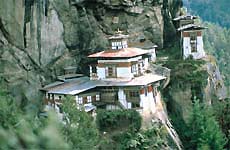 |
Helvetas |
Swiss
Development Projects |
 |
 |
Bhutan's Education |
 |
Bhutan Information |
|
|
 |
| Cooperation Bhutan - Switzerland |
|
Bhutanese
students are poor in maths |
November
2001
A
study of Classes VI and VIII common examination results, from 1994 to 2000,
concludes that Bhutanese students find mathematics difficult.
Conducted
by the Educaton Department, with assistance from Helvetas, the study also
shows that English and Dzongkha share 'a negative correlation', meaning
that a student who performs well in English is poor in Dzongkha and a strong
Dzongkha student is poor in English.Overall, the report notes that there
is a significant reduction in the gender gap in enrolment. The proportions
of boys and girls in Class VI narrowed from 61.4 and 38.6 in 1990 to 54.6
and 45.4 percents in 1999. Class VIII saw a similar trend.
To
assess the performance of the primary school certificate examinations (PSCE)
the report analysed results from 1994 to 1998.
Science
was found relatively easier for most students. Students in Thimphu, Paro,
and Haa, and the districts in the south performed badly in Dzongkha. Gasa
students, who were at the bottom in their English results, topped the Dzongkha
marks. Samtse students were better than all the others in mathematics and
Lhuntse topped the history,geography, and science results.Seven urban schools
- located in major towns with roads, electricity, hospitals, markets, and
telecom facilities -and 20 rural schools were compared to analyse the differences
between urban and rural schools. Students of urban schools were stronger
in English, science, history, and mathematics but were weaker in Dzongkha.
The report attributes the poorer performance of rural schools in almost
all subjects to the absence of amenities like electricity, lack of information,and
poor infrastructure and teaching facilities.The report noted that boys
achieved higher marks in all the subjects except English.
The
report used sample data for the years 1996 to 2000 to assess the lower
secondary school certificate examinations (LSSCE) results.There was not
much difference in the pattern of performance of the students between Classes
VI and VIII. Class VIII students found mathematics,science, and history
difficult. Their performance in Dzongkha showed better improvement than
the other subjects.
Like
the students of Class VI, boys tended to do better in all subjects except
English. Thimphu students again fared better in English but those in the
other dzongkags were stronger in Dzongkha. The differences in other subjects
were not so significant.
In
analysing the progress between Class VI and Class VIII there was a drop
in the students' performance in English, mathematics, Dzongkha, and
science in the year 2000. Three methods of comparison were used to formulate
the report. The first method compared the results in all subjects for all
schools at the national level. The second assembled the results of all
subjects under a dzongkhag 'cohort'. The last compared the performance
of different student groups like boys and girls, urban and rural students.
The 29-page report is intended to serve as an input for finalising a strategic
education master plan. Its author, Pema Norbu, states in the preface that
the report is also expected to provide feedback to schools, curriculum
developers, administrators, and policy makers in the department of education.
The
report points out that an area that must be given attention is the performance
in mathematics, which is seen as a persistently difficult subject. "A natural
conclusion would be to re-visit the structure and strength of teaching
methodologies of mathematics currently in practice at the teacher training
institutes within the country," it said.
top
|
With
assistance from Helvetas: Renovation of Taktshang Monastery |
November
2001
US
$ 50,000 donated to reconstruction of Taktshang monastery
 |
An
American has donated US $ 50,000 towards the reconstruction of Taktshang
monastery. Frequent visitor to Bhutan and devotee of Taktshang monastery
Mr. Bobby Sager handed over the money to the home minister Lyonpo Thinley
Jamtsho recently, said a spokesman from the home ministry. Mr. Sager first
visited Taktshang monastery in 1994 and has traveled to various parts of
the kingdom with his entire family.
A
sum of Nu 18.2 million has so far been received through donations both
inside and outside the country for the reconstruction process of Taktshang. |
|
"This
does not include a 1.6 kilometre cable crane donated by Helvetas, Switzerland, found to be most useful in transporting construction materials tothe site,"
said the deputy secretary PPD from the ministry of home affairs. The reconstruction
of Taktshang monastery has so far cost Nu 65.50 million and is expected
to be complete in 2002.
| more information on Bhutan |
 |
| Links |
 |
 |
 |
Externe Links |
 |
 |
Official
website of the Department of Human Resources, Bhutan
NTTA |
  |
Helvetas |
|
|


